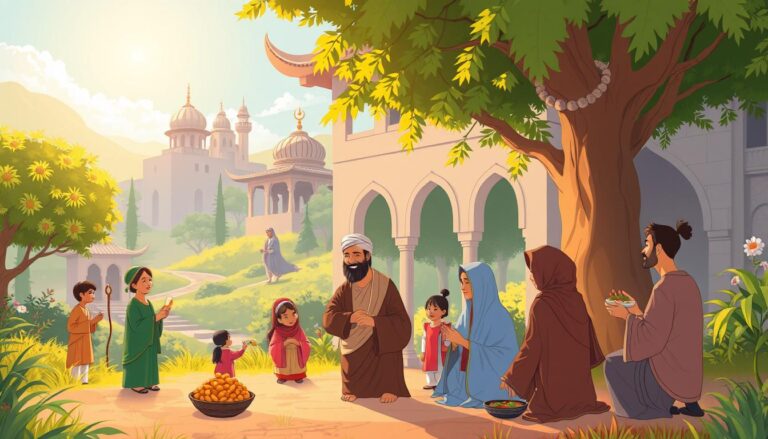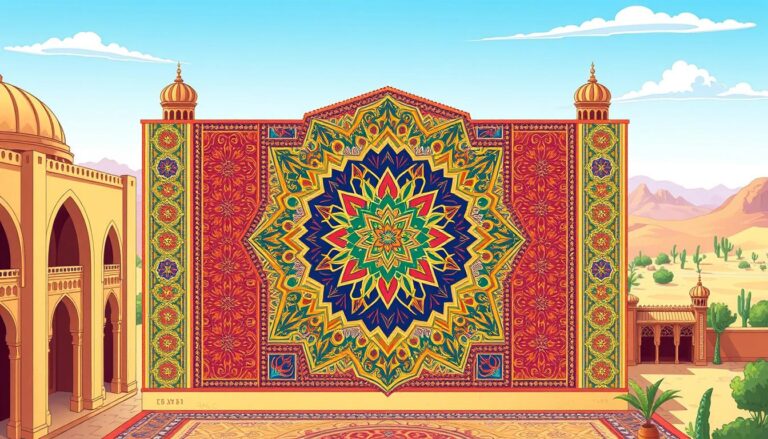Stories of the Prophets: Wisdom for Today’s World
Ever thought how old wisdom can help us today? The stories of prophets in Islam give us insights that still matter. These tales, full of wisdom, light our way through life’s tough times.
Take the story of Prophets Dawud and Suleiman from Surah Al Namal. It’s about a farmer and a rancher who disagree. It teaches us about fairness and finding new solutions. These stories are key to Islamic teachings, teaching us about justice, kindness, and wisdom.
“Stories of the Prophets” explores the lives of many prophets, from Adam to Muhammad. It’s more than just stories; it’s a guide for our everyday lives. Facing personal or big problems, these stories offer new views and hope.
Key Takeaways
- Prophetic stories offer timeless wisdom for modern challenges
- Quranic narratives provide practical lessons in justice and problem-solving
- “Stories of the Prophets” book covers lives from Adam to Muhammad
- These stories are suitable for readers of all ages
- Prophetic wisdom can guide personal and societal decision-making
- Islamic teachings emphasize spiritual growth and resilience
- Ancient wisdom can provide fresh perspectives on contemporary issues
Introduction to Prophetic Narratives
Prophetic stories in Islam are full of moral lessons and spiritual guidance. These stories, filled with ancient wisdom, still have value today. They teach us about human nature and our purpose in life.
The Significance of Prophetic Stories in Islam
In Islam, prophetic stories are very important. They help teach about faith, perseverance, and being moral. The Quran, Islam’s holy book, has many of these stories. It shows how crucial they are for Muslim beliefs and actions.
Relevance of Ancient Wisdom in Modern Times
Even though these stories are old, they still teach us important lessons today. They talk about things like justice, kindness, and growing as a person. For example, the story of Joseph teaches us about patience and forgiveness. These are just as important today as they were long ago.
Overview of Key Prophets in Islamic Tradition
Islam recognizes many prophets, each with their own stories and teachings. Some of the most well-known include:
- Adam: The first human and prophet
- Noah: Known for his unwavering faith during the great flood
- Abraham: Revered as the father of monotheism
- Moses: Remembered for leading the Exodus and receiving the Ten Commandments
- Jesus: Respected in Islam for his teachings of love and compassion
- Muhammad: Considered the final prophet in Islamic tradition
Each prophet’s story gives us unique moral lessons and spiritual insights. They guide us in our daily lives and spiritual journeys.
The Creation of Adam: Lessons in Human Nature
The story of Adam’s creation in the Quran teaches us a lot. Allah made Adam from clay and gave him life. He also taught Adam the names of all things.
The angels were surprised by Allah’s choice. They thought Adam might cause trouble. Allah said, “I know things you don’t.” This shows the wisdom in creating humans.
Adam’s story is about making choices and being responsible. When Allah asked the angels to bow to Adam, they all did. But Iblis refused, showing pride. This teaches us to avoid pride and follow Allah’s commands.
“The world is sweet and green, and Allah has made you stewards in it, and He sees how you acquit yourselves.” – Prophet Muhammad
The Quran teaches us to care for Earth. It tells us to learn, use resources well, and grow spiritually. These lessons are still important today, helping us live a balanced and meaningful life.
Noah’s Ark: Perseverance in the Face of Adversity
The story of Noah and the Great Flood teaches us about faith and staying strong. Noah’s journey was long, filled with tests that showed us important moral lessons.
The Story of the Great Flood
Noah preached for 950 years, but only a few believed him. He built an ark 30 meters tall over 80 to 100 years. This huge ark saved Noah’s family and all kinds of animals.
Noah’s Unwavering Faith and Patience
Noah faced rejection and mockery, but his faith never faltered. He waited nearly a thousand years, showing incredible patience. The flood lasted six months, and the ark kept believers safe.
Applying Noah’s Resilience in Today’s Challenges
Noah’s story is still relevant today. His ability to stay strong despite disbelief is something we can learn from. His lessons of patience and perseverance help us face our own challenges.
“The ark Noah built was a testament to his faith, each plank a symbol of his unyielding belief in the face of ridicule.”
Abraham: The Father of Monotheism
Abraham is a key figure in Islamic teachings, known as the father of monotheism. His strong faith in one God is a cornerstone of wisdom. His journey from believing in many gods to one God is a lesson for today’s believers.
The idea of monotheism started in the 1660s by Henry More. It comes from Abraham’s belief in one God. Abraham is seen as the first to believe in one God, unlike Adam who was the first human. His covenant with God is the base of the three major religions.
Abraham faced many challenges that tested his faith. He left his home and even had to sacrifice his son. His faith in God’s plan shows true devotion. These stories teach us valuable lessons for our own struggles.
“We have made you [believers] into a just community, so that you may bear witness [to the truth] before others and so that the Messenger may bear witness [to it] before you.” – Quran 2:143
Abraham’s wisdom goes beyond religion. His bravery in questioning idols and seeking truth is inspiring today. His story pushes us to think about our faith, challenge norms, and connect deeply with God.
- Abraham’s journey from polytheism to monotheism
- The significance of Abraham’s covenant with God
- Lessons from Abraham’s trials and unwavering faith
- Applying Abrahamic wisdom in contemporary life
In today’s complex world, Abraham’s legacy guides and inspires us. His story teaches us about faith, courage, and a personal relationship with God.
Moses and the Exodus: Leadership and Liberation
The story of Moses in the Quran teaches us about leadership and freedom. Moses went from being a prince to a prophet, showing us how to find our purpose.
From Palace to Prophecy
Moses lived in Pharaoh’s palace for 40 years and then in the wilderness for another 40. This experience made him ready to free his people. His call to be a prophet was a deep conversation with God, showing us the value of divine guidance.
Timeless Moral Guidance
The Ten Commandments given to Moses are still guiding us today. These laws helped shape many societies and teach us important values. They emphasize respect, honesty, and caring for others.
Courage in the Face of Oppression
Moses’ story is about bravery against tyranny. In Egypt around 1290 B.C., the Hebrews were slaves and faced racism. Moses bravely asked Pharaoh to free his people, teaching us to stand up for what we believe in.
“Let my people go!”
The Exodus teaches us that freedom comes with a price. Like Moses, leaders like Martin Luther King Jr. and Dietrich Bonhoeffer sacrificed for justice and freedom. Their courage inspires us to face today’s challenges.
Stories of the Prophets: Wisdom for Today’s World
The stories of prophets give us timeless wisdom for today. These old tales offer insights into facing modern problems. From Adam to Muhammad, each prophet’s story teaches us about faith, staying strong, and doing what’s right.
A popular podcast series dives into these prophetic stories, led by Molana Faizan Wahid. It looks into the lives of figures like Noah, Abraham, and Jesus. Listeners get spiritual food and learn from history through these talks.
The prophets’ stories connect with today’s issues:
- Adam’s story teaches about human nature and responsibility
- Noah shows us how to keep going in tough times
- Abraham is a symbol of strong faith
- Moses teaches us about leading in hard times
These stories talk about big ideas like bravery, kindness, and standing up for what’s right. They give us real advice for handling our own problems and the world’s big challenges.
“The prophets’ stories light the way of faith and doing what’s right in our complicated world.”
By looking into these old stories, we see new ways to tackle today’s problems. The wisdom from the prophets pushes us to be understanding, patient, and fight for fairness every day.
Jesus in Islamic Tradition: Compassion and Miracles
Islamic teachings highly regard Jesus as a respected prophet. The Qur’an mentions Jesus by name twenty-five times. It details his story, teachings, and miracles, offering a unique view of Jesus.
In Islam, Jesus is one of the five major messengers of God. His miraculous birth, wisdom, and kindness are highlighted. The Qur’an shows Jesus as a prophet-teacher, focusing on his human side and divine mission.
The Islamic view of Jesus stresses the importance of monotheism. This belief is shared among Abrahamic faiths. Jesus’ teachings on loving God and others resonate with Islamic values of compassion and unity.
“Love God with all your heart and love your neighbor as yourself.”
Muslims believe Prophet Muhammad confirmed the messages of previous prophets, including Jesus. This shows the universal nature of divine teachings across traditions.
- Jesus is mentioned 25 times in the Qur’an
- Islam views Jesus as a prophet and messenger of God
- Emphasis on monotheism and compassion in Jesus’ teachings
Understanding Jesus’ role in Islamic tradition can improve interfaith dialogue and respect. It shows the shared values of compassion, faith, and ethical living that go beyond religious boundaries.
Prophet Muhammad: The Seal of Prophets
Prophet Muhammad is seen as the final messenger of Allah in Islamic teachings. His life and mission teach us valuable lessons. The Quran says in Surah Al-Ahzab (33:40) that Muhammad is the last of the prophets. This makes him the “Seal of the Prophets”.
The Life and Mission of Muhammad
Muhammad was born in Mecca during the Year of the Elephant. His early life was tough. He was orphaned young but grew up as “The Honest” and “The Truthful”.
At 40, he got his first revelation in Cave Hira. This started his prophetic journey.
Key Teachings and Their Modern Applications
Muhammad taught us about being honest, compassionate, and just. His teachings are still important today. The Quran, given to Muhammad, guides believers in many areas of life.
The Prophet’s Example in Personal and Social Conduct
Muhammad showed us kindness and generosity. He stood up for the weak, helped widows and orphans, and fought for equality. His marriage to Khadija, who was older, shows mutual respect and love.
- Muhammad gave to those in need
- He helped solve disputes
- His teachings bring believers together
The Prophet’s example still inspires many today. His wisdom helps us face modern challenges while staying true to Islamic values.
Prophetic Wisdom in Dealing with Contemporary Issues
Prophetic stories give us wisdom for today’s problems. In our fast world, we often react without thinking. But the teachings of prophets guide us through tough times.
Prophet Muhammad showed us how to handle personal attacks. He chose mercy, humility, and a wider view. This wisdom helps us think before we act.
“The Prophet emphasized the importance of wisdom as a characteristic to be sought and embraced by believers.”
When faced with conflicts, Muhammad listened to everyone. He looked for common ground and didn’t take sides. This balanced way is key in our divided world. It teaches us to understand before we judge.
After winning Makkah, Muhammad chose forgiveness over revenge. This lesson is crucial for leaders after conflicts. It shows the power of forgiveness and unity.
- Seek peace until forced to defend
- Practice patience and moderation
- Embrace mercy and restraint
These lessons from prophets give us a way to face today’s issues. They teach us to be thoughtful and kind. These timeless teachings are essential in our complex world.
Conclusion
The stories of the prophets give us wisdom for today. These tales, full of Quran interpretation and spiritual guidance, teach us about personal growth and improving society. From Adam to Muhammad, each prophet’s story gives us insights into human nature and divine wisdom.
Prophet Sulaiman’s story, as found in Quranic verse 27:16, shows the value of divine blessings and using them wisely. He could talk to animals and control nature, showing the balance between humans and the environment. His dedication to justice and seeking knowledge inspires leaders today.
The Hadith says, “Seeking knowledge is obligatory for every Muslim,” which matches the prophets’ focus on wisdom and understanding. Stories like Noah’s, Abraham’s, and Moses’ teach us how to face today’s challenges.
“The prophets’ stories are not just historical accounts, but living lessons for our daily lives.”
Reflecting on these teachings, we’re urged to use their wisdom in our lives. The stories of the prophets, deeply rooted in Quran interpretation and spiritual guidance, guide us in the 21st century. They offer timeless solutions to our modern problems.
References and Further Reading
If you want to learn more about Islamic teachings and the Quran, there’s a lot to explore. The Hebrew Bible’s wisdom literature, like Proverbs, Ecclesiastes, and Job, is full of insights. These texts cover many life topics, from family to work, offering wisdom that still applies today.
Islamic scholars have written many books that explain prophetic stories for today’s readers. They show how ancient wisdom relates to our current problems. These works stress the need to seek knowledge and spiritual advice, as seen in Prophet Musa’s story.
Some recommended books include classic Quran commentaries, modern interpretations of prophetic tales, and studies on Islamic ethics. These resources help us understand the wisdom of prophets and apply it to our lives. They teach us to face challenges with patience, perseverance, and faith.
Source Links
- Abdul Nasir Jangda – Stories of the Prophets #24 Wisdom
- Uncover the Wisdom of Stories of the Prophets Book | Hikmah Boutique
- The Prophets of the Old Testament – Hopelify Media
- What Prophecy is For
- Prophet Adam — The Epitome of Life on Earth (Part 1)
- Prophet Adam story – Biographies of prophets | Islamicfinder
- The Story of Nuh (Noah) AS: A Tale of Piety, Perseverance, and Devotion
- Islamic Prophets Stories for Kids: Timeless Lessons and Moral Teachings
- Was Adam a Monotheist? A Reflection on Why We Call Abraham Father and Not Adam
- Buy The Eternal Monotheism: A Study of The Prophets from Abraham to Jesus: 3 (Discovering the Divine and the Eternal Life) Book Online at Low Prices in India | The Eternal Monotheism: A Study of The Prophets from Abraham to Jesus: 3 (Discovering the Divine and the Eternal Life) Reviews & Ratings
- Moses and Leadership Struggles in the Exodus Narrative
- 25 Stories of the Prophets – Ibrahim (عليه السلام) – Going to Makkah |Molana Faizan Wahid
- Prophets of Weirdness
- Our Top Ten Prophets – The God Who Speaks
- Finding and Following Jesus: The Muslim Claim to the Messiah | Yaqeen Institute for Islamic Research
- Jesus: A Foundation for Dialogue Between Muslims and Christians | Yaqeen Institute for Islamic Research
- ✨ Exploring the "Seal of the Prophets" ✨
- The Life and Character of the Seal of the Prophets
- Prophets of Allah – Prophet Muhammad: Seal of the Prophets
- Lessons from Prophet Muhammad’s Wisdom, Patience & Foresight | About Islam
- Prophetic Wisdom | CPS GLOBAL
- 2020-24 PROPHETIC WORDS — Daily Prophetic
- Unlocking the Wisdom of Prophet Sulaiman: A Journey through Islamic History
- Conclusion: The Companion, the Prophets, and the Unseen
- Intro to the Wisdom Literature
- Prophet Musa and Khidr: the Quest For Divine Knowledge







